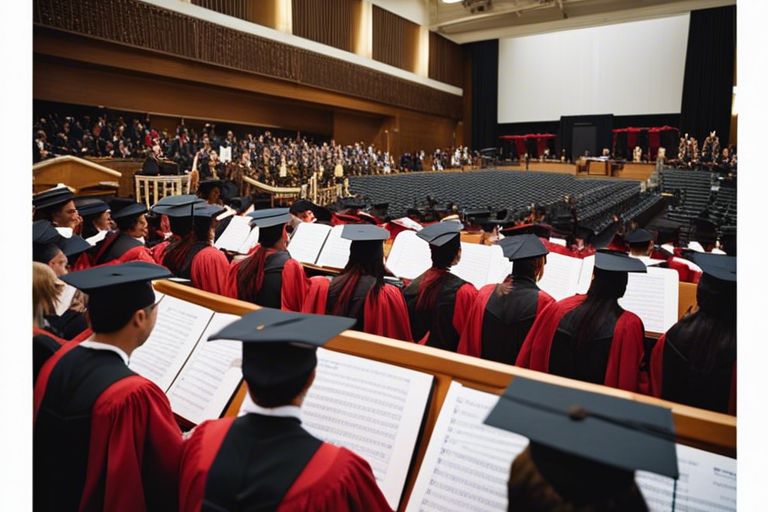There’s a pinnacle of musical education that is often sought after by serious musicians and performers: the Doctorate of Musical Arts (D.M.A.). This advanced degree goes beyond mastering performance and composition skills; it probes deep into music theory, history, research, and professional expertise. In this blog post, we will explore the significance, requirements, and potential career paths for those pursuing a D.M.A. in the world of music.

Key Takeaways:
- Advanced Music Degree: The Doctorate of Musical Arts (D.M.A.) is an advanced music degree that focuses on performance, composition, or conducting.
- Focus on Practical Skills: D.M.A. programs emphasize the development of practical skills and professional experience in the field of music.
- Research Component: D.M.A. candidates often have to complete a research project or dissertation in addition to performance requirements.
Overview of the Doctorate of Musical Arts (D.M.A.)
Definition and Scope
One of the highest degrees in the field of music, the Doctorate of Musical Arts (D.M.A.) is a terminal degree that aims to prepare students for careers in music performance, composition, conducting, or music education at the university level.
Historical Development
With its roots dating back to the early 20th century, the D.M.A. has evolved to meet the changing demands of the music industry and academia. Initially seen as a professional degree for performers, it has expanded to incorporate research and pedagogy, making it a comprehensive and rigorous program for aspiring musicians.
Core Components of the D.M.A. Program
Coursework and Curriculum
Curriculum in a Doctorate of Musical Arts (D.M.A.) program typically includes advanced coursework in music theory, music history, pedagogy, and performance practice, tailored to the student’s area of specialization. Students engage in seminars, practical workshops, and independent study to deepen their understanding of music theory and performance.
Performance and Research Requirements
Curriculum of a D.M.A. program demands a significant commitment to both performance and research. In addition to coursework, students are required to give public performances, recitals, or concerts demonstrating their mastery of their instrument or voice. They also conduct original research, culminating in a written dissertation that contributes new knowledge to the field of music.
It is through the combination of intensive coursework, rigorous performance requirements, and original research that students in a D.M.A. program develop the expertise and skills necessary to succeed as professional musicians, educators, and scholars in the field of music.

Career Opportunities with a D.M.A.
For those pursuing a Doctor of Musical Arts in Music Performance, various career opportunities are available in academia and professional music industries.
Academic Roles
Academic positions such as professor, music director, or researcher at universities and music schools await D.M.A. graduates. These roles often involve teaching, conducting ensembles, and contributing to scholarly publications.
Professional Music Careers
For instance, D.M.A. holders can work as solo performers, studio musicians, or conductors with orchestras. Additionally, opportunities in arts management, music production, and music therapy are viable career options for D.M.A. graduates looking to diversify their professional portfolio.

Challenges and Considerations
Time and Financial Commitment
Your D.M.A. journey will require a significant time and financial commitment. Any aspiring candidate must be prepared to dedicate several years to completing coursework, research, and a final project or dissertation. Financially, the cost of tuition, materials, and possibly lost income from reduced performance opportunities during studies should also be considered.
Balancing Performance and Scholarship
Commitment to both performance and scholarly pursuits is crucial during a D.M.A. program. Finding the right balance between honing your musical skills and engaging deeply with academic research can be challenging but rewarding. It’s crucial to understand that the D.M.A. is not solely focused on performance; scholarly rigor and critical thinking are also vital components of the degree.
Scholarship: Embracing the scholarly aspect of a D.M.A. does not detract from your musical abilities but enhances them. Through research, analysis, and writing, you can deepen your understanding of your art and contribute valuable insights to the field of music.
Conclusion
Summing up, Doctorate of Musical Arts (D.M.A.) is a rigorous and advanced program designed for dedicated musicians looking to pursue a career in performance and academia. Through intensive study, research, and performance, candidates hone their skills and expertise in their chosen musical field, preparing them to make significant contributions to the world of music.
FAQ
Q: What is a Doctorate of Musical Arts (D.M.A.)?
A: A Doctorate of Musical Arts (D.M.A.) is a terminal degree in music that is typically pursued by those who wish to have a career in musical performance, composition, conducting, or teaching at the university level. It is a rigorous and intensive program that requires advanced musical skills and knowledge.
Q: What are the main components of a D.M.A. program?
A: The main components of a D.M.A. program include coursework, comprehensive exams, a doctoral dissertation or final project, and recitals or performances. Coursework covers advanced music theory, music history, pedagogy, and specialized topics related to the student’s area of focus. Comprehensive exams test the student’s knowledge in these areas. The doctoral dissertation or final project is a significant research or creative work that demonstrates the student’s expertise in their field.
Q: What are the career opportunities for someone with a D.M.A. degree?
A: Graduates with a Doctorate of Musical Arts degree have various career opportunities available to them. They can pursue careers as university professors, professional musicians, conductors, composers, music directors, or consultants. Some may also choose to work in arts administration, music therapy, or music technology. A D.M.A. degree demonstrates a high level of expertise and commitment to the field of music, opening doors to diverse and fulfilling career paths.

